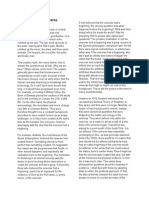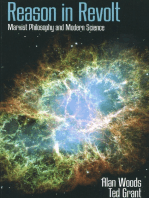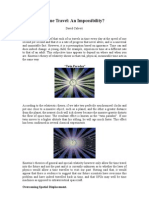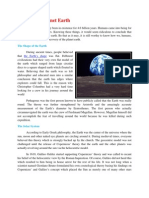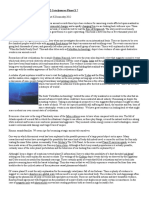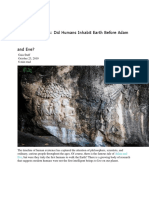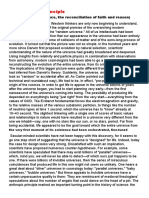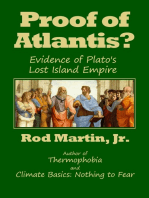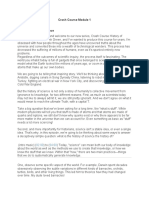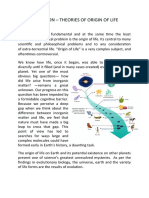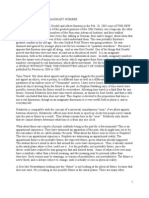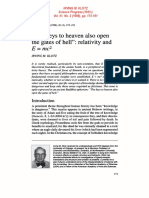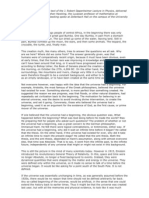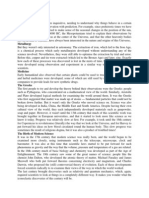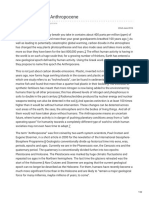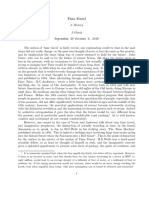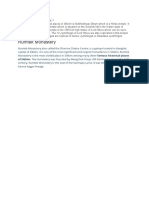0 ratings0% found this document useful (0 votes)
16 viewsDocumentry On Space Time
Documentry On Space Time
Uploaded by
talese.egetadThis document discusses the history of ideas about the age and origins of the universe. It was originally thought that the universe was static and unchanging, but it became clear that this conflicts with the idea of human progress over time. While some preferred to believe the universe had always existed, this view is difficult to reconcile with the Second Law of Thermodynamics, which implies the universe must have had a beginning.
Copyright:
© All Rights Reserved
Available Formats
Download as RTF, PDF, TXT or read online from Scribd
Documentry On Space Time
Documentry On Space Time
Uploaded by
talese.egetad0 ratings0% found this document useful (0 votes)
16 views2 pagesThis document discusses the history of ideas about the age and origins of the universe. It was originally thought that the universe was static and unchanging, but it became clear that this conflicts with the idea of human progress over time. While some preferred to believe the universe had always existed, this view is difficult to reconcile with the Second Law of Thermodynamics, which implies the universe must have had a beginning.
Original Description:
xccc
Original Title
doc
Copyright
© © All Rights Reserved
Available Formats
RTF, PDF, TXT or read online from Scribd
Share this document
Did you find this document useful?
Is this content inappropriate?
This document discusses the history of ideas about the age and origins of the universe. It was originally thought that the universe was static and unchanging, but it became clear that this conflicts with the idea of human progress over time. While some preferred to believe the universe had always existed, this view is difficult to reconcile with the Second Law of Thermodynamics, which implies the universe must have had a beginning.
Copyright:
© All Rights Reserved
Available Formats
Download as RTF, PDF, TXT or read online from Scribd
Download as rtf, pdf, or txt
0 ratings0% found this document useful (0 votes)
16 views2 pagesDocumentry On Space Time
Documentry On Space Time
Uploaded by
talese.egetadThis document discusses the history of ideas about the age and origins of the universe. It was originally thought that the universe was static and unchanging, but it became clear that this conflicts with the idea of human progress over time. While some preferred to believe the universe had always existed, this view is difficult to reconcile with the Second Law of Thermodynamics, which implies the universe must have had a beginning.
Copyright:
© All Rights Reserved
Available Formats
Download as RTF, PDF, TXT or read online from Scribd
Download as rtf, pdf, or txt
You are on page 1of 2
documentry on space time
The time scale of the universe is very long compared to
that for human life. It was therefore not surprising that
until recently, the universe was thought to be essentially
static, and unchanging in time. On the other hand, it
must have been obvious, that society is evolving in
culture and technology. This indicates that the present
phase of human history can not have been going for
more than a few thousand years. Otherwise, we would
be more advanced than we are. It was therefore natural
to believe that the human race, and maybe the whole
universe, had a beginning in the fairly recent past.
However, many people were unhappy with the idea that
the universe had a beginning, because it seemed to imply
the existence of a supernatural being who created the
universe. They preferred to believe that the universe, and
the human race, had existed forever. Their explanation
for human progress was that there had been periodic
floods, or other natural disasters, which repeatedly set
back the human race to a primitive state. This argument
about whether or not the universe had a beginning,
persisted into the 19th and 20th centuries. It was
conducted mainly on the basis of theology and
philosophy, with little consideration of observational
evidence. This may have been reasonable, given the
notoriously unreliable character of cosmological
observations, until fairly recently. The cosmologist, Sir
Arthur Eddington, once said, 'Don't worry if your theory
doesn't agree with the observations, because they are
probably wrong.' But if your theory disagrees with the
Second Law of Thermodynamics, it is in bad trouble. In
fact, the theory that the universe has existed forever is in
serious difficulty with the Second Law of
Thermodynamics. The Second Law, states that disorder
always increases with time. Like the argument about
human progress, it indicates that there must have been a
beginning.
You might also like
- An Alternative View of The Distant PastDocument361 pagesAn Alternative View of The Distant PastJacobs Pillar75% (4)
- Week 2 Lesson - Historical Antecedents in Which Social Considerations Changed The Course of Science and TechnologyDocument9 pagesWeek 2 Lesson - Historical Antecedents in Which Social Considerations Changed The Course of Science and TechnologyChe NelynNo ratings yet
- Stephen Hawking - The Origin of The UniverseDocument5 pagesStephen Hawking - The Origin of The UniverseCamille Sigrid VasquezNo ratings yet
- An Illustrated History of Science: From Agriculture to Artificial IntelligenceFrom EverandAn Illustrated History of Science: From Agriculture to Artificial IntelligenceNo ratings yet
- A History of Science: From Agriculture to Artificial IntelligenceFrom EverandA History of Science: From Agriculture to Artificial IntelligenceNo ratings yet
- Cognition and History: The Evolution of Intelligence and CultureDocument32 pagesCognition and History: The Evolution of Intelligence and Culturelewisedgar100% (1)
- history of science -- Britannica Online Encyclopedia_90cc71de717ee5d79b0b96f1e16384bcDocument39 pageshistory of science -- Britannica Online Encyclopedia_90cc71de717ee5d79b0b96f1e16384bcEklesia Lempoy PokuNo ratings yet
- Time Travel: An Impossibility?Document6 pagesTime Travel: An Impossibility?David Calvert100% (1)
- Facts About Planet EarthDocument8 pagesFacts About Planet EarthfactsaboutearthNo ratings yet
- What Is "Catastrophism" in Biology?Document16 pagesWhat Is "Catastrophism" in Biology?life hacksNo ratings yet
- DASTON YANG Time and Time Again-Deep Time Chicago PRINTDocument24 pagesDASTON YANG Time and Time Again-Deep Time Chicago PRINTSofia LopesNo ratings yet
- Martin - Experience of The New World and Aristotelian Revisions of The Earth's Climate During The RenaissanceDocument16 pagesMartin - Experience of The New World and Aristotelian Revisions of The Earth's Climate During The RenaissancejNo ratings yet
- 2012 Cataclysms or Planet XDocument5 pages2012 Cataclysms or Planet XChristine NarvasaNo ratings yet
- The Pre AdamitesDocument7 pagesThe Pre AdamitesHamza Mujagic75% (4)
- The Anthropic PrincipleDocument3 pagesThe Anthropic PrincipleΑντώνης ΧρυσόπουλοςNo ratings yet
- Latour - Bruno - 2014 - Agency at The Time of The AnthropoceneDocument19 pagesLatour - Bruno - 2014 - Agency at The Time of The AnthropoceneNicole KastaniasNo ratings yet
- The Story of Biology: From the evolution of species to genetic engineeringFrom EverandThe Story of Biology: From the evolution of species to genetic engineeringNo ratings yet
- Eureka! (Icon Science): The Birth of ScienceFrom EverandEureka! (Icon Science): The Birth of ScienceRating: 3.5 out of 5 stars3.5/5 (6)
- Deep Time at The Dawn of The AnthropoceneDocument31 pagesDeep Time at The Dawn of The Anthropocenecri-tiinaNo ratings yet
- A History of Science (Volume 2)Document308 pagesA History of Science (Volume 2)simona robuNo ratings yet
- Atlantis: Evidence: Mission: Atlantis, #3From EverandAtlantis: Evidence: Mission: Atlantis, #3Rating: 4.5 out of 5 stars4.5/5 (2)
- Journal of World History, VolDocument18 pagesJournal of World History, VolJay ManalNo ratings yet
- Matter in The Making - Langston Day With George de La WarrDocument92 pagesMatter in The Making - Langston Day With George de La Warrrik100% (3)
- Jordheim - Natural Histories For The Anthropocene Koselleck S Theories and The Possibility ofDocument35 pagesJordheim - Natural Histories For The Anthropocene Koselleck S Theories and The Possibility ofAlessonRotaNo ratings yet
- David Christian, "World History in Context"Document22 pagesDavid Christian, "World History in Context"AndoingNo ratings yet
- Crash Course Module 1Document16 pagesCrash Course Module 1Ashley De GuzmanNo ratings yet
- Assignment History of ScienceDocument8 pagesAssignment History of ScienceEnochNo ratings yet
- The Mechanics of Time TravelDocument8 pagesThe Mechanics of Time Traveltracyxu08No ratings yet
- A History of Science, Volume 2 (Of 5 - Henry Smith WilliamsDocument151 pagesA History of Science, Volume 2 (Of 5 - Henry Smith WilliamsRolando CasaleNo ratings yet
- Bio IpDocument17 pagesBio IpPrerana ChaithraNo ratings yet
- The Great Filter and The Fermi ParadoxDocument6 pagesThe Great Filter and The Fermi ParadoxSantos TreviñoNo ratings yet
- Earth's Deep History: How It Was Discovered and Why It MattersFrom EverandEarth's Deep History: How It Was Discovered and Why It MattersRating: 4 out of 5 stars4/5 (14)
- Agad Vs Mabato DigestDocument14 pagesAgad Vs Mabato DigestChristopher PhilipNo ratings yet
- X-Risk: How Humanity Discovered Its Own ExtinctionFrom EverandX-Risk: How Humanity Discovered Its Own ExtinctionRating: 4.5 out of 5 stars4.5/5 (2)
- God and Physics: From Hawking To Avicenna William E. CarrollDocument13 pagesGod and Physics: From Hawking To Avicenna William E. Carrollabulhayat1969No ratings yet
- The Return to Cosmology: Postmodern Science and the Theology of NatureFrom EverandThe Return to Cosmology: Postmodern Science and the Theology of NatureRating: 4 out of 5 stars4/5 (2)
- Illogical Geology, the Weakest Point in the Evolution TheoryFrom EverandIllogical Geology, the Weakest Point in the Evolution TheoryNo ratings yet
- Atheism-Proved UNSCIENTIFIC Terribly So . Very 19 TH Century!Document26 pagesAtheism-Proved UNSCIENTIFIC Terribly So . Very 19 TH Century!Raja Bhoj LaundebaazNo ratings yet
- Journey 35 - TIME IS AN IMAGINARY NUMBERDocument3 pagesJourney 35 - TIME IS AN IMAGINARY NUMBERChristopher C. Humphrey, Ph. D.93% (14)
- The Anthropocene, Megalomania, and The Body EcologicDocument14 pagesThe Anthropocene, Megalomania, and The Body EcologicOrlando OrtizNo ratings yet
- Klotz - The Keys To Heaven Also Open The Gates of Hell - Relativity and E mc2Document19 pagesKlotz - The Keys To Heaven Also Open The Gates of Hell - Relativity and E mc2EstimoNo ratings yet
- Origins of The UniverseDocument5 pagesOrigins of The Universecaarito_No ratings yet
- A Brief History of ScienceDocument2 pagesA Brief History of ScienceterezkiNo ratings yet
- The Rise and Fall of Atlantis: And the Mysterious Origins of Human CivilizationFrom EverandThe Rise and Fall of Atlantis: And the Mysterious Origins of Human CivilizationNo ratings yet
- Rise of Modern ScienceDocument8 pagesRise of Modern ScienceMandeep Kaur PuriNo ratings yet
- Marxism and The AnthropoceneDocument22 pagesMarxism and The AnthropoceneClaudio LartigueNo ratings yet
- Emags MidtermsDocument175 pagesEmags MidtermsJohnjoseph VeraNo ratings yet
- 21 Earth ScienceDocument2 pages21 Earth Sciencems.ziggy.21No ratings yet
- Time TravelDocument8 pagesTime Travelu55982274No ratings yet
- Sujay Reducing Latency Time in Science Final Final Final Final Final FinalDocument12 pagesSujay Reducing Latency Time in Science Final Final Final Final Final FinalSujay Rao MandavilliNo ratings yet
- Smart TeacherDocument7 pagesSmart Teachertalese.egetadNo ratings yet
- Rumtek Monastery: 'Siddheshwar DhamDocument1 pageRumtek Monastery: 'Siddheshwar Dhamtalese.egetadNo ratings yet
- Animal FarmDocument1 pageAnimal Farmtalese.egetadNo ratings yet
- 1 XCCVBDFBDBBFBFDocument1 page1 XCCVBDFBDBBFBFtalese.egetadNo ratings yet


